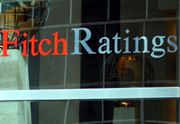Dupa S&P, si Fitch scade ratingurile Romaniei, scotand-o din categoria statelor cu calificativ "investment grade" |
Autor: Bancherul.ro
2008-11-10 09:00 |
|
 Agenţia de evaluare Fitch a scos Romānia din categoria statelor cu calificativ "investment grade" prin coborārea ratingului pentru credite pe termen lung īn valută, cu două trepte, la BB-plus, de la BBB, arată Reuters.
Agenţia de evaluare Fitch a scos Romānia din categoria statelor cu calificativ "investment grade" prin coborārea ratingului pentru credite pe termen lung īn valută, cu două trepte, la BB-plus, de la BBB, arată Reuters.
"Romania va apela probabil la ajutor financiar extern pentru a preveni o criza a creditului suveran, intrucat se confrunta cu un deficit de cont curent asteptat sa depaseasca in acest an 14 procente din PIB", spune Fitch.
Decizia survine dupa ce luni, 27 octombrie, si agenţia de evaluare financiară Standard & Poor's, a coborāt cu o treaptă ratingurile Romaniei, scotand tara noastra din categoria statelor care au calificative din categoria "investment grade" acordate de această agenţie.
Decizia S&P a fost criticata dur de catre analisti si reprezentanti ai Bancii Nationale a Romaniei, guvernatorul Mugur Isarescu sugerand chiar agentiei sa-si revizuiasca pozitia.
Stirea Reuters:
Fitch cut Romania's credit rating to "junk" status in one of four emerging market downgrades on Monday and said the global financial crisis had put ratings of South Korea, South Africa, Russia and Mexico in jeopardy.
The ratings agency's move comes nearly two weeks after a Standard & Poor's downgrade turned the east European country into the only European Union member state with a non-investment grade credit rating and is the latest sign that the global financial crisis is still spreading across emerging markets.
Foreign investors, once bullish on eastern Europe's prospects of strong economic growth and deeper integration into the EU, have dumped assets on concern that countries such as Ukraine and EU members Hungary, Romania, Bulgaria and the Baltic states may not be able to handle their large foreign debt burdens, which could spark financial crises.
Fitch cut ratings for four Eastern European countries, including cutting Romania to below investment-grade. It also lowered its outlook on South Korea, Mexico, Russia and South Africa to negative from stable, while that of Chile and Malaysia were cut to stable from positive.
The actions are part of a review of 17 big investment-grade emerging markets, which resulted in four downgrades and seven outlook revisions, it said on Monday.
Emerging markets with current account deficits and those reliant on short-term external funding have been among the worst hit by the crisis that has already led the International Monetary Fund to provide loans to Hungary and Ukraine.
The widespread risk aversion has led foreign investors to flee markets such as South Korea in droves, aggravating the liquidity crunch faced by these countries.
BIG CHALLENGES
Fitch said the world's largest economies were facing a recession that could be as severe as those of the early 1980s and 1990s, casting doubt over how less developed economies can adjust, even if some have more robust balance sheets and liquidity positions than in previous times of turmoil.
"The profound shift in the global economic and financial outlook poses significant real economy and policy challenges for emerging markets," David Riley, head of Fitch's global sovereign ratings group, said in the statement.
"Policymakers in emerging economies have even less scope for policy errors than their counterparts in so-called 'advanced' countries, but they are better placed to navigate these challenges than ever before."
Emerging European countries are the most vulnerable to a financial crisis, Fitch said, given their large current account deficits and their reliance on short-term borrowing.
Fitch cut ratings on Bulgaria and Kazakhstan by one notch to BBB-, the lowest investment-grade level, and lowered Hungary to BBB from BBB-plus. The agency cut Romania by two notches to BB-plus from BBB.
Romania is likely to require external financial support to prevent "a sovereign credit crisis", Fitch said, as it deals with a current account deficit that is expected to exceed 14 percent of gross domestic product this year.
Romania last month rejected criticism of its economic policies and said it did not need IMF help, while the Washington-based institution denied reports that it was talking about a rescue package with one of the EU poorest member states.
Fitch's echo those made by S&P last month, which warned of mounting risks to Romania's economy due to rising private sector debt and its dependency on increasingly uncertain foreign markets. It said policymakers had ignored warnings and were instead focused on general elections scheduled for Nov. 30.
|
|

